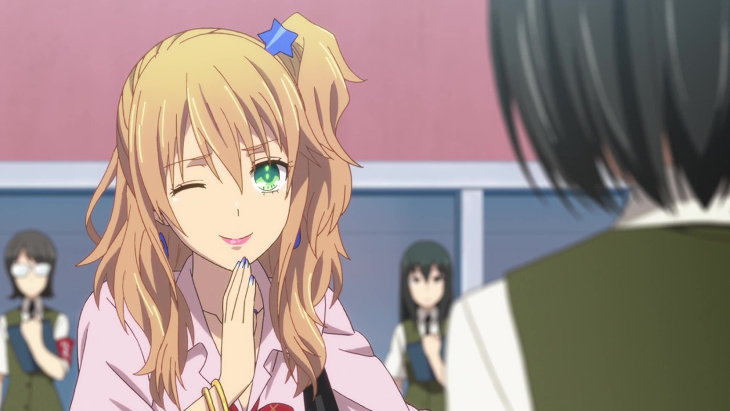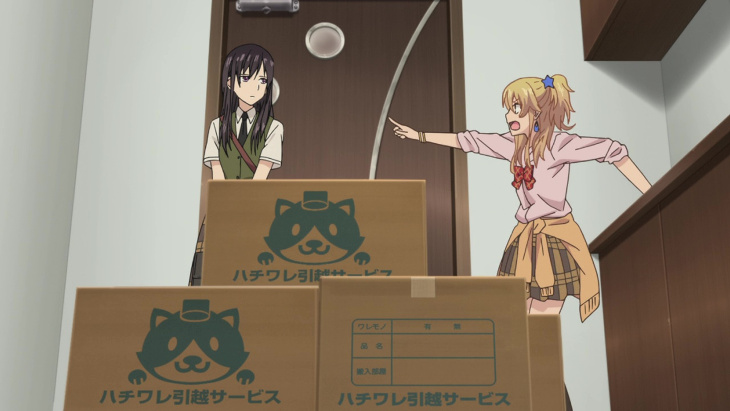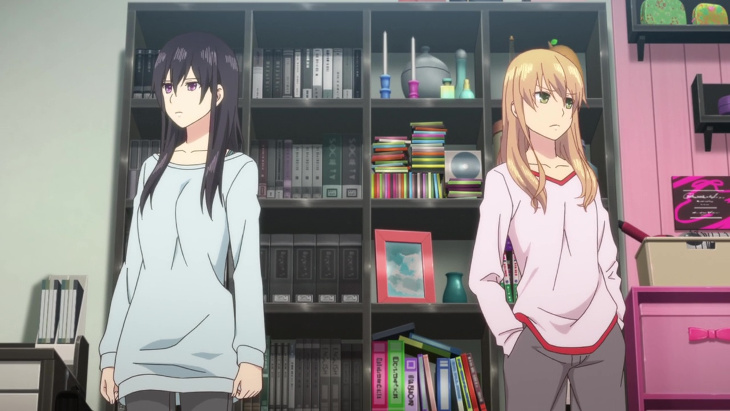
“Oh, did I forget to tell you? Starting today, you’ll have a little sister.”
As a fan of romance anime, I’m not exactly a stranger to both yuri and yaoi titles, though I also can’t proclaim to have explored either subgenre thoroughly. Part of this is due to a common trend of such series being fanservice laden schlock. This is hardly a universal quality, but it’s a common enough occurrence that finding that rare diamond in the rough can be a daunting prospect. Fortunately, if I have an issue with citrus, it isn’t prolific-fanservice, but that I find the lead character to be annoying and that it throws us a family dynamic so bizarre it completely breaks the show’s established tone. Still, as far as yuri series are concerned, this is about middle-of-the-road as far as tactfulness is concerned. It definitely comes with some rather unnecessary twists that make the show more awkward than it needs to be, and strains the viewer’s suspension of disbelief, but I may reserve judgment on some of those elements for the time being.
As I alluded before, our main character, Aihara Yuzu, plays to a particular character type that I find I have a limited tolerance for, the stylish girl. If I were to compare our primary pairing to any two characters anime, it would be to the two leads from Nana. Much like Nana’s Hatchi, Yuzu can be a bit of a ditz. She prioritizes having a stylish appearance, and she has an preoccupation with finding a boyfriend that can feel clingy. None of these qualities are necessarily a deal breaker though, since a show like this is built on how the two leads balance each other out. However, our other lead, Aihara Mei, is still a little bit of a blank slate. Much like Nana’s… well, Nana, she has a cool but distant quality which ensures we don’t exactly get a firm grasp of what makes her tick right out of the gate. The two meet when Yuzu is forced to move to a new all-girls school (because it is ALWAYS an all-girls school) due to her mother marrying a new husband whom Yuzu has yet to meet. Mei, despite being a first-year, is the student council president and is quick to call out Yuzu on her inappropriate behavior and attire. So far so good, right? Two contrasting personalities are placed at odds with one another, but forced by various circumstances to come to a greater understanding. You can almost see how that could develop into something halfway decent, right? And I’m not just saying that because Nana exists. Too bad they’re sisters.

Yeah, that’s the big wrench that gets thrown into the works midway through the episode, though chances are most viewers would call that twist well in advance, regardless of how stupid it may seem. I swear that four of the dumbest words in anime are, “Didn’t I tell you?” Sure enough, this is one of those ridiculous series where characters behave in completely incomprehensible ways to try and establish an insane premise. In this instance, Yuzu’s mother somehow failed to relay the fact that her new husband was not only part of the family that owns the school, but that he has a daughter who will now be living with them. Furthermore, the husband himself is apparently going abroad, so he remains completely inconsequential to the plot outside of putting the ball in motion simply by existing. It’s odd to see an instance of a human McGuffin, but from this point on, I guarantee I’ll be referring to this illusive father as Mr. Guffin. Theoretically, an overly contrived setup can be justified through a complementary tone or through the unique drama that can arise from such a scenario. Series like Ouran Highschool Host Club and Fruits Basket serve as strong examples. Unfortunately, the reveal that the two leads are sisters, step or no, will likely serve as a significant barrier to entry for many, myself included.

As for presentation, the show actually puts a good foot forward. It has a slightly angular shojo style that ensures that even the more dressed down characters are visually appealing. The only downside to this artistic approach is it makes Yuzu’s initial ‘stylish’ appearance come off as excessive and gaudy. Admittedly, that may have been the intent by the creators, but, in that case, it was excessive in its excess. There are also many of CG characters hanging about in the background, but I’m confident in saying that they’re sufficiently passable. Had I not been preparing a review of the series, I doubt I would have given them a second thought. As for the fanservice, it’s definitely present, but generally doesn’t feel intrusive. There are two uncomfortable kisses that occur, one towards the middle and one at the end, that definitely have a lurid quality to them, but, once again, that may be by design. In the end, this episode proves to still be trashy, but isn’t even close to the standards established by many of its brethren.
Before I wrap up, a few Notes and Nitpicks:
- If you were to ask me what my favorite yuri anime is, I suppose I’d have to go with Maria Watches Over Us, though I do question whether categorizing it as ‘yuri’ is even fair.
- I do wonder what the gender demographics for the creators of these types of shojo & shonen-ai series look like. Here, the mangaka, Saburouta, appears to be female, but, because these series can target a broad variety of fans, it can sometimes be difficult to guess.
- The visuals aren’t always subtle. All of Mei’s books and furniture are monochromatic while Yuzu’s are vibrant and multicolored. It feels like there should be some form of gag here, but, if that’s what it was intended to be, then they forgot the punchline.
- The two instances in which Mei interacts physically with Yuzu come across as creepy. As distant as she tends to be, there is an odd predatory quality to those moments. Again, this may be intentional, but, if it is, I don’t know what the end goal is.




Add comment